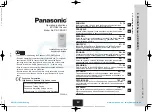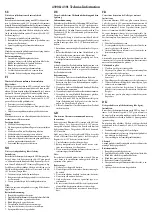Reviews:
No comments
Related manuals for steadicam solo

EX-20 Series
Brand: Panasonic Pages: 6

EX-10 Series
Brand: Panasonic Pages: 3

ECONAVI CZ-CENSC1
Brand: Panasonic Pages: 8

CX-400 Series
Brand: Panasonic Pages: 9

AR42P9W - Plasma Panel anti-glare Filter
Brand: Panasonic Pages: 5

A032
Brand: Tamron Pages: 3

Nova-233 G2
Brand: Baicells Pages: 32

C965
Brand: BAFANG Pages: 18

DP C240.CAN
Brand: VANPOWERS Pages: 23

DRM-02
Brand: F&F Pages: 8

vimble 2
Brand: FeiYu Tech Pages: 6

SLUGGUARD
Brand: Faudi Pages: 18

C9300 Series
Brand: Oki Pages: 2

C5300n
Brand: Oki Pages: 32

57959
Brand: Varta Pages: 2

UVC-G3
Brand: Ubiquiti Pages: 24

4390
Brand: S-BOL Pages: 3

Ondrejnik
Brand: W-Tec Pages: 6



























